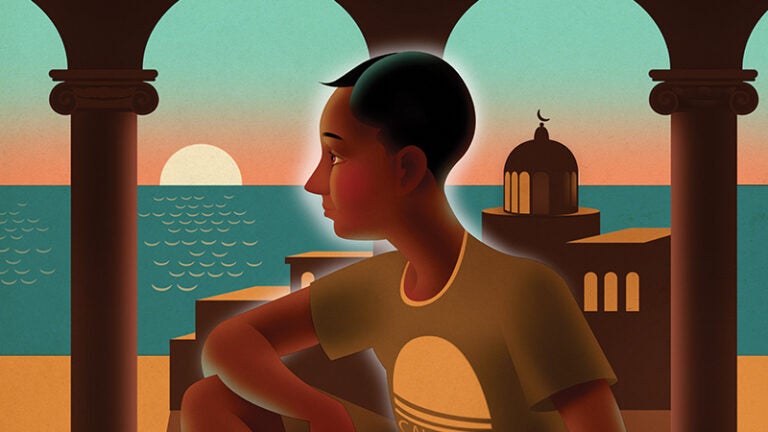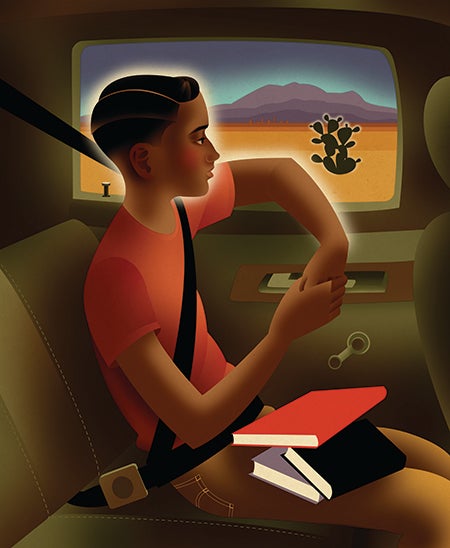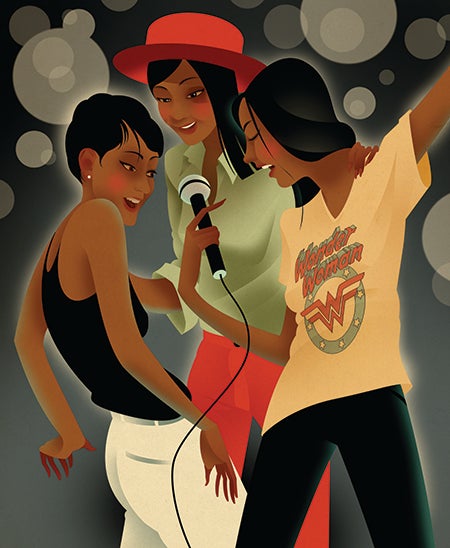
Traveling Home
As a Palestinian child growing up in Libya, Moh El-Naggar would play among the ruins of Leptis Magna on the coast. Anywhere else, the ancient Roman city — a UNESCO World Heritage site perched on the Mediterranean Sea — would undoubtedly have been a tourist draw. But in the mostly closed country ruled at the time by Muammar Gaddafi, it was the backdrop for kicking around a soccer ball or playing hide-and-seek with friends.
El-Naggar remembers that despite the challenges of the ruling regime, he had a very happy childhood. With seven people under one roof in his hometown of Tripoli, everyone was either laughing or arguing. “Either way, it was always exciting,” he said.
When the time came for college, El-Naggar traded one bustling city for another, leaving Tripoli for Cairo. But after one semester, the Egyptian government denied his visa to study for reasons that were never made clear to him.
So, he weighed his options and decided to move to Bethlehem, Pennsylvania, to attend Lehigh University. With family friends nearby, his parents felt safe sending off their youngest where loved ones could look after him. However, the sleepy college town with a population that barely pushed 70,000 was a shock to his system.
“It was a wonderful place, but I was used to dense, urban areas with millions of people,” El-Naggar said. It was also nothing like the images he had seen of America in the movies.
Despite the jolt of an unfamiliar setting, the move was also a dream come true — he was living in America and studying science and engineering.
Some people pack a bag and head out across borders in search of discovery. For many, that journey means finding home. Sometimes it’s in the spirit of adventure. Or often, as with El-Naggar, the move is guided by necessity. Whether their motivation stems from politics, civil unrest, economic instability, a natural disaster or sheer adventure, a common thread remains — creating a better life for themselves and their families.
Nearly 20 years later, El-Naggar, Robert D. Beyer (’81) Early Career Chair in Natural Sciences and associate professor of physics, biological sciences and chemistry at USC Dornsife, continues to call the United States home.
After earning his bachelor’s degree, he moved west, where the climate was more like that of his hometown, and the population was more in tune with his image of America. He earned a Ph.D. in engineering and applied science from Caltech.
He now runs a lab at USC Dornsife studying, among other things, the potential for microbes to enable new renewable energy technologies. In 2013, President Barack Obama acknowledged El-Naggar’s innovative research at the frontiers of science and technology by bestowing on him the Presidential Early Career Award for Scientists and Engineers.
El-Naggar’s immigration to the United States from Africa embodies the ideals of the American Dream: coming to a country founded on democracy where citizens are encouraged to pursue success under a banner of idealism that advocates for liberty, equality and opportunity.
And that, of course, is the main draw for many immigrants who want to make the U.S. their home, said Manuel Pastor, Turpanjian Chair in Civil Society and Social Change and professor of sociology and American studies and ethnicity. Pastor directs the Center for the Study of Immigrant Integration (CSII) at USC Dornsife, which studies how to support newcomers to America by finding ways to encourage their economic mobility, civic participation and positive social reception.
“People come to the United States because it’s a place of economic opportunity,” he said. “There’s also traditionally a sense that you can become American not just because of blood and soil, but by accepting a certain set of principles and values around democracy, accountability and responsibility.”
Immigration by the numbers
As a sociologist and self-proclaimed “data nerd,” Pastor spends a lot of his time looking at immigration statistics. What he has noticed in the past few years is that much of what he hears in the news does not reflect what the data actually shows.
“The national debate about immigration is, for anybody who knows the numbers, really misplaced,” Pastor explained.
“If I run for office in Mexico or the United States, it would be to help out the community.”A large part of the conversation has centered around the idea that illegal immigrants are coming in droves to the U.S., taking jobs and resources from citizens. The reality, Pastor said, is that the undocumented population declined in the United States from 2007–09 and has been pretty much stable since then. A Pew Research Center study estimates that around two-thirds of the undocumented population has called the U.S. home for at least a decade.
This group also tends to boost the economy in a number of ways, Pastor said. For instance, they pay more in taxes than they receive. “Undocumented immigrants pay about $6 billion a year into Social Security, which is money that they will never be able to get back.
“So, the image of somebody who just crossed the border needs to be shifted in favor of reality, which is someone who probably has pretty deep roots in the United States,” Pastor said. Further, when it comes to immigrants from Mexico, more Mexicans are actually leaving the U.S. than arriving.
“The fact is that the era of mass illegal immigration is over,” Pastor said.
With the current national debate, he sees a parallel to the rhetoric on immigration that took place in California in the early ’90s, when voters passed Proposition 187. The ballot initiative sought to strip undocumented people of social and educational services (although virtually all of it was eventually struck down in court). He connects Californians’ unease then to a shift in demographics, which mirrors the current shift in the U.S. population.
Between 1980 and 2000, minorities became the majority in California, he explained, which is roughly the same demographic change that the U.S. is slated to go through between 2000 and 2050.
“If you think about demographic anxiety, economic uncertainty and polarized politics, California was the poster child for what you see going on in the United States as a whole right now,” Pastor said. “Indeed, you could say that the U.S. just had its Prop 187 moment.”
The dual narratives of immigrants at once taking jobs and using up welfare resources doesn’t really add up. “It’s hard to do both of those things at the same time,” Pastor said. “These ideas are being driven by an emotional reaction to the change in our country.”
Split city
As someone who has made a home in both the U.S. and Mexico, USC Dornsife student Enrique Licon has been inspired to help flip the narrative by pursuing a career in politics.

Student Enrique Licon traveled daily back and forth across the border between his home in Juárez, Mexico, and his school in El Paso, Texas, where he was born.
Licon was born in the Texas border town of El Paso to an American mother and a Mexican father. Shortly after his birth, Licon, currently an economics and political science major, moved less than 10 miles south into Juárez, Mexico.
He spent the majority of his youth making the drive across the border to attend school in El Paso. He would leave the dense metropolis of Juárez before sunrise. His commute would take him through the Chihuahuan Desert along the border of Texas up to the international crossing, where he could make out El Paso’s cityscape carved into the basin surrounded by low mountains.
The experience of growing up in Juárez and attending school in El Paso has given Licon a valuable perspective on the current issues surrounding the relationship between the U.S. and Mexico. With the negative depictions of Mexicans emanating from Washington, D.C., he said he works hard to be a positive representation of Mexicans as a reminder that there are real people being affected by the harsh rhetoric and unforgiving immigration policies.
Licon sought an education at USC because he found programs that would help him achieve his goals, particularly through the Jesse M. Unruh Institute of Politics, where he is currently on staff. He has taken full advantage of the institute’s internship programs, working at two different political consulting firms and participating in a civic engagement teaching internship. There, he and other USC Dornsife students led Los Angeles-area high school students in a program designing a community improvement plan. He has also interned in U.S. Sen. Dianne Feinstein’s Washington, D.C., office, working with her education and drug caucus teams.
“Since I’ve been at USC, I’ve been taught by people who have worked on presidential campaigns and a very famous economist. I appreciate the opportunity, and plan to make the most of it,” he said.
Now in his senior year, Licon is considering attending law school — after a stint working a full-time job after graduation. His ultimate goal is a career in politics, either in Mexico or the U.S.
“If I run for office in Mexico or the United States, it would be to help out the community,” Licon said, “to be a voice for the people.”
Community and culture are enduring elements of childhood that help construct who we become and how we shape the course of our lives. This is especially true for those like Licon who crossed borders at a young age.
Indeed, nothing could be truer for Karen Tongson, who continues to explore what cross-cultural experiences mean for immigrant communities — and for herself.
A pop of culture
Two experiences were pivotal in shaping Tongson’s childhood and possibly the trajectory of her career. At the age of 10, she and her mother and stepfather moved from the Philippines to Riverside, California, at the time a predominantly white community. Her unfamiliar appearance and darker skin tone piqued the interest of the children in her neighborhood.
She remembers very distinctly one afternoon when a large group of kids surrounded her on her lawn.
“What are you? What’s your religion?” they probed. Tongson, who is now associate professor of English, gender studies and American studies and ethnicity at USC Dornsife, explained she was from Manila, a large city in the Philippines. “Do they have toilets there?” one child asked.
An academic from the start, she set off for the public library to procure a picture book that showed the megalopolis with its skyscrapers, which, she pointed out, were of course equipped with toilets.

USC Dornsife’s Karen Tongson found that Karaoke and pop culture helped her transition to life in the United States after migrating from the Philippines.
The other significant experience was her own personal entrée into American popular culture. Though she already spoke English in addition to her native Tagalog, and grew up watching American television in the Philippines — “CHiPs, Charlie’s Angels, Little House on the Prairie, you name it,” she said — once she was in the U.S., those programs became a significant cultural translator for her.
“Sesame Street. The Electric Company. Those shows helped me learn how to read,” Tongson said. “For me, the sense of education, of knowledge, of worlds being opened up came through popular culture as a conduit.”
Now, Tongson studies and teaches popular culture, examining how it relates to immigrant communities. Her research also extends to race, gender and sexuality studies; literature and critical theory; Los Angeles, the Southern California region and the Pacific Rim; and contemporary food cultures.
But it was her early interactions that heavily influenced her approach to her academic examination of pop culture.
“I never sensed that these popular objects were trash or less than significant, especially because they were so formative to my own educational experiences and my own capacity to move through different worlds,” Tongson explained. “Pop culture reveals, in many respects, our desires in ways that the documents of official culture don’t.”
In fact, Tongson’s first name has its own pop culture origin. Hailing from a family of musicians going back several generations in the Philippines — including her mother — she was named after Karen Carpenter. Many said Tongson’s mother’s singing voice resembles that of the musical icon.
Tongson has a forthcoming book about Carpenter and her music as part of the brother sister duo the Carpenters. Their Southern California sound holds a special place in the musical culture of the Philippines to this day, Tongson said.
“The Carpenters’ music was incredibly popular when I was a child, but it’s remained enduringly so, especially in the Philippines,” she said. “I’m never there for longer than 24 hours without hearing a Carpenters song on the radio or having it play somewhere publicly with people singing along. It taps into my earliest memories of sound, of music, of being with my family and my extended family in the Philippines.”
It also connects her to her life as an adolescent transported from Manila to L.A.’s suburbs, not far from where the Carpenters made their music. The experience of music crossing cultures to bring together immigrant communities is the topic of another book Tongson is currently at work on. The book examines karaoke culture.
“Karaoke draws out for us the connections between places in the Pacific Rim and the cultures and communities of big cities on the West Coast where many immigrants from those countries eventually settled,” Tongson said. “Karaoke gives us a sense of the connection that people who have left home forge with one another through the music they miss and want to perform again to conjure those feelings of home, as well as new bonds.”
“I never sensed that these popular objects were trash or less than significant, especially because they were so formative to my own educational experiences …”Beyond the melting pot
Looking at these spaces where immigrants allow the cultures of their birth countries and their adopted cultures to overlap reveals what it means to be American, Pastor posits.
Intrinsic to CSII’s definition of immigrant integration is the encouragement of integration over assimilation — a new take on the traditional idea of America as a cultural melting pot.
“Assimilation means disappearing into the melting pot like crayons becoming one color,” Pastor explained. “Increasingly that’s not what communities want to do. And it’s not what young people want to do.”
Rather than a place where newcomers are absorbed into American society, instead their differences are celebrated and woven into the fabric of American culture to create something much more dynamic.
“Think of it like this,” Pastor said. “Hamburgers are good, but do we want everyone to just eat hamburgers? Or, do we want to make sure that we encourage a phenomenon like the Korean taco truck?” referring to the L.A.-bred, Korean-Mexican taco sensation. “That is a phenomenon of fusion, and not of assimilation.”
Encouraging diversity also breeds innovation, especially when it comes to scientific discovery, El-Naggar points out. His own experience allowed him to work with top researchers in the U.S., which has been a longtime leader in the fields of science, technology, engineering and mathematics.
But that position has been fueled by the free flow of information — that is, scientists who move to the U.S. to work in labs — and federal support of scholarship. Right now, restrictions on immigration are weakening one of those pillars.
“Many talented scientists are choosing to stay where they are or going to other countries that they might perceive as being friendlier,” El-Naggar said. “That’s fantastic for those countries but it also could mean that it would have a negative impact on the quality of our scientific production over the next few years.”
The United States gains tremendously from the innovation, the hard work and the energy of immigrants, agreed Pastor.
“The U.S. has this tremendous advantage of being a place where people feel like they can experiment and realize their dreams.”
Read more stories from USC Dornsife Magazine’s Spring-Summer 2018 issue >>